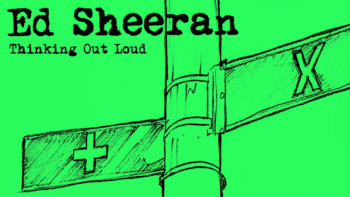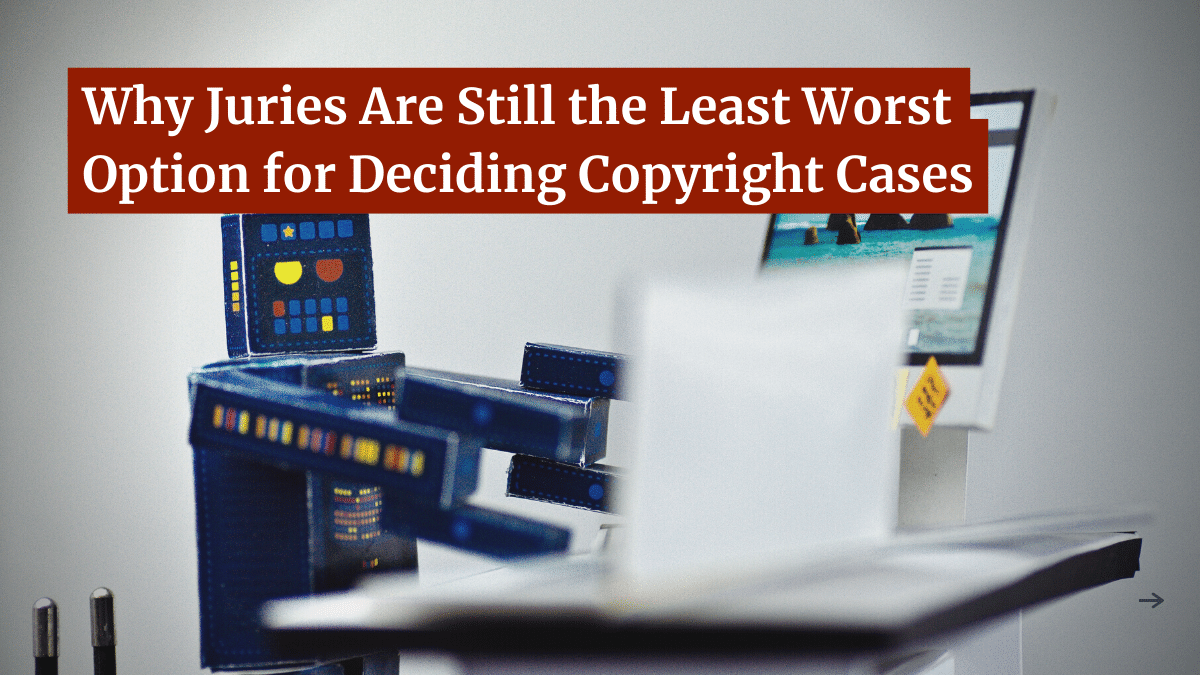Why Bots Shouldn’t Decide Copyright Cases

Last week, a judge in the Ed Sheeran Thinking Out Loud case denied a motion for summary judgment, setting the case on the path toward an eventual trial.
The case pits Sheeran against Structured Asset Sales, a company that owns a one-third stake in the copyrights of Ed Townsend. Townsend, along with Marvin Gaye, co-wrote the song Let’s Get it On, which the plaintiffs argue was infringed by Sheeran’s hit.
Sheeran’s attorneys argued the elements that were allegedly copied, namely a chord progression and the harmonic rhythm, were both commonplace in music and not protectable by copyright.
However, the judge ruled that it most copyright-protected works are made up of unprotectable elements and that there is no “bright line” rule if these elements combined were protectable or not.
As such, the judge felt that this was a matter for a jury and set the case down that path.
In addition to denying the motion for summary judgment, the judge also that Sheeran’s concert profits would be considered when calculating damages should he found to have infringed.
The ruling surprised many, who didn’t expect the case to make it to trial. That expectation was understandable as, in 2016, members of the Townsend estate filed a similar lawsuit comparing the two songs. That case was dismissed in 2017.
This one, filed in 2018 by Structured Asset Sales, however, appears to have survived those hurdles. This case clearly illustrates how, with copyright, two different cases with nearly identical facts can have wildly different outcomes depending on the court and the litigators involved.
However, the case has also stoked fears that songwriting has become too litigious, and that’s led some to call for a different approach. However, the one thing that can be said about juries is that they are often the least bad solution we have in these situations.
Songwriting and Litigation
There’s not much doubt that there is more litigation around songwriting. Much of the uptick began after the March 2015 Blurred Lines ruling, where the estate of Marvin Gaye won a $7.3 million judgment against Robin Thicke and others involved in the song.
The case itself didn’t change the legal landscape significantly, something later rulings highlighted. However, it did inspire more litigation in this space and, according to reports, kept many lawyers busy answering calls on the topic.
This has been paired with another trend, judges appear to be more reluctant to dismiss copyright claims.
Part of this is likely because there has been a slew of high-profile cases being overturned. For example, in one of the lawsuits over Taylor Swift’s song Shake it Off, an appeals court overturned a lower court’s dismissal of the case on the grounds that similarities didn’t qualify for copyright protection.
We’ve also seen this outside of the music industry, with the Ninth Circuit reviving a lawsuit against Apple over the TV show Servant.
For many, this has created an atmosphere of uncertainty and, according to Newsweek, one lawyer, Andrew M. Lieb, proposed creating “algorithmic-based tests” that would resolve such disputes instead of juries.
The desire is easy to understand. Juries are unpredictable and often rule inconsistently, getting to a jury is both time-consuming and resource-draining and such verdicts rarely provide guidance in future cases, as with the Blurred Lines case.
But as flawed as juries are in copyright, an algorithm is not a better answer. The reason is all over YouTube.
The Battle of the Bots
Obviously, turning over such decisions to an algorithm is not possible in the current legal system. But, even if it were, a bot would be a poor substitute for a jury.
Specifically, bots have three problems when it comes to copyright cases:
- Copyright is Nuanced and Difficult: Computers, in general, do their best work when making binary choices. However, much of copyright is not binary and is filled with gray areas and decisions that can only be made with context the bot may not have.
- Bots Are Not Transparent: Most modern algorithms are trained using examples and are honed by being told when they are right and when they are wrong. While we can see the input and the output of such a bot, we have little insight into how it made its decision. We’ve already seen cases of algorithms exhibiting racist and sexist behavior and, without transparency, these are problems that are difficult to fix.
- Humans Will Try to Game It: When you make a bot a gatekeeper, humans will immediately try to game it by finding loopholes in the bot’s algorithm. The goal is to find ways to pass the bot’s tests, while defeating its purpose.
You can see all three of these issues on YouTube. Though YouTube likely has the best copyright bots in the world, they still have constant issues of non-infringing material being flagged for copyright violations, pirated content being uploaded and questionable claims of copyright ownership.
While it’s true that the bots of YouTube work well enough more than 99% of the time, when you’re dealing with as much content as YouTube, that leaves thousands of cases per day where the bots failed.
Any music bot would face similar mathematical challenges. Currently, some 60,000 tracks are uploaded to Spotify every day. Even if a music bot was 99.9% accurate. That would still result in 60 tracks every day, nearly 22,000 tracks per year, where the bot made the wrong call.
Those cases where the bot was wrong would inevitably be the very gray area cases where we see litigation today, bringing us back to square one where humans, most likely juries, have to sort these cases out.
Bots are able to help YouTube because the vast majority of the copyright questions are clear-cut. But even their bots struggle with edge cases and gray areas. Unfortunately, those the kinds of cases an algorithm would need to be best at to take the place of juries.
Bottom Line
I understand well both the frustration and the fear. Juries are unpredictable, they are expensive to get to, and there seems to be a lot more music-related lawsuits going around.
However, having a bot resolve such a dispute is not a good solution. Though bots can help in certain situations, this would require bots making nuanced decisions based upon complicated information. This is what bots are worst at right now.
Instead, what may work better, is creating a system similar to the Copyright Claims Board where such cases be heard. This can be a place where experts in musical copyright hear the cases and make decisions.
That, clearly, is not a perfect approach either, but I suspect many musicians would feel better if claims could be addressed more cheaply and quickly while being examined primarily by experts rather than laypeople.
Regardless, humans need to be a part of the process when it comes to copyright. Though we suck at making decisions around copyright and infringement issues, we suck less than the alternatives.
It’s a low bar, but one that we, as humans, do cross easily.
Want to Reuse or Republish this Content?
If you want to feature this article in your site, classroom or elsewhere, just let us know! We usually grant permission within 24 hours.
